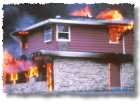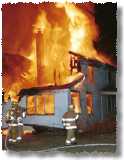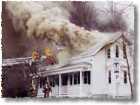
Surviving a House Fire

 A housefire requires immediate, get-out-now, evacuation. There is no time to collect the family photo albums or autographed baseball. You need to get everyone out NOW!
A housefire requires immediate, get-out-now, evacuation. There is no time to collect the family photo albums or autographed baseball. You need to get everyone out NOW!
To greatly improve your chance of survival, there are tons of things you can do before and during a housefire. Take some time now to do them.

Fire Preparation Plan
Prepare for a fire as if you expect it to happen. For the past 10 years, there have been over 4,000 deaths and 22,000 injuries each year in our country from fire.
Do these things:
- Install smoke detectors on every floor and outside every bedroom. Check them monthly.
- Buy fire extinguishers and check periodically.
- Personal items by each bed - flashlight, handkerchief, robe, sturdy slippers or shoes.
- Emergency escape ladders in each upper floor bedroom.
- Map of the house:
- Mark every bedroom with names.
- Mark shut-off points for gas, water, electricity.
- Mark every door and window exit.
- Teach every family member how to exit from different rooms
- Arrange furniture under windows to aid exit

Fire Evacuation Plan
Your house fire evacuation plan should include:
- Meeting Point - safe place such as neighbor's front yard or lamp post across the street.
- Emergency Contact - out-of-town grandparents or friend that everyone will call if separated. Memorize the numbers.
- Personal Protection - Grab flashlight and handkerchief. Put on robe and shoes.
- Quickest Exit - use escape ladders from upper floor, windows on lower if necessary.
- Map of the house in your Grab and Go kit - to show firefighters
- Teach every family member how to exit from different rooms
- Have everyone memorize emergency contact number
Fire Practice
Evacuating during a housefire requires some special skills. It's a good idea (and can be fun) to practice these skills too:
- have everyone in bed and appoint one child to be the 'alerter' that smells smoke first. He should start the evacuation by alerting other family members.
- have everyone blindfolded to simulate a smokey, nighttime fire.
- stay low to the ground or crawling when moving to escape some smoke and heat.
- cover mouth with a cloth handkerchief.
- feel doors before opening - if the door is hot, go another way.
- pretend someone's clothes catch fire and help them stop, drop, and roll.
- close doors behind you to slow the spread of fire.
- gather at meeting place and then pretend to call the fire department.
Other things to do periodically with the family:
- Perform a home safety check
- Recite emergency contact numbers
- Review location of and how to shut off utilities
- Practice evacuating at least twice a year - summer and winter
- Practice exiting from every room
- Combine this practice with your semi-annual food and water check
Next: Home Safety Check
Find Emergency and Disaster Info at EmergencyDude.com
